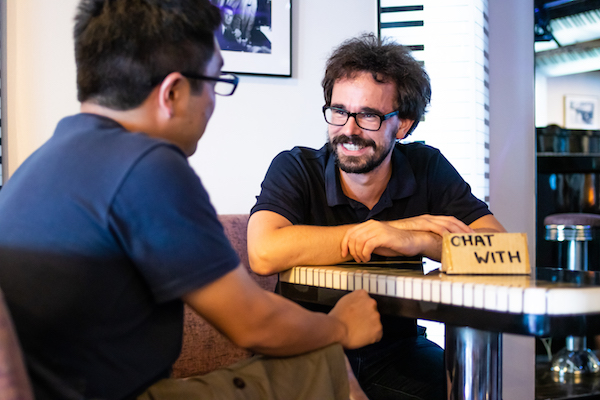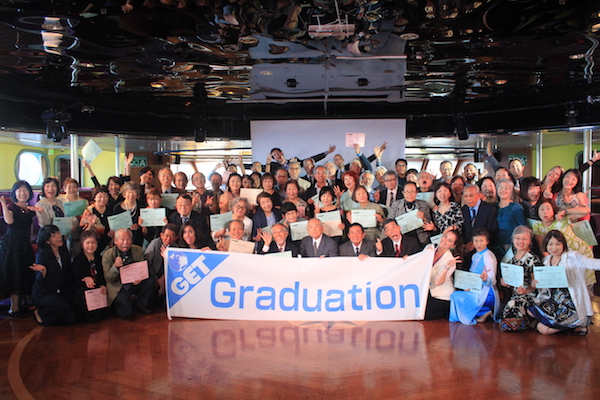GET はじまりの物語:GETプログラム誕生秘話【後編】
皆さん、こんにちは。
GETでは、クルーズ船で地球を一周をしながら 世界の人々とつながるための英語とスペイン語を学ぶ、ユニークな語学プログラムを提供しています。
ただ、そんなGETのプログラムがどのように始まったのかをお伝えする機会が、今まであまりありませんでした。
昨年GETの創設者の1人である Rachael Armstrongに改めて当時の話を聞き、その話を基に元スタッフの Sarah Andersonが英文記事を作成しました。
(ピースボート英語HPに記載:https://peaceboat.org/english/news/Creating-GET)
今回は前回に引き続き「GET はじまりの物語:GETプログラム誕生秘話」と称してみなさんにお届けします!
こちらのページは、【後編】です。 (前半は、こちらからご覧いただけます!)
お読みいただき、GETの歴史や想いを知っていただけると嬉しいです。Happy reading!
In late 1999 Peace Boat decided that what Rachel and Daniel had created was something all future voyages needed. This new language program would support in internationalizing the community and fulfill Peace Boat’s mission to build a culture of peace in the world by giving participants the language tools to connect with people from beyond the borders of their own country. In order to fund class materials and support bringing on more volunteer teachers the program would charge students for tuition in the intensive classes. The first formal English program launched on the 35th Global Voyage in 2001, and Spanish was officially offered on the 36th Global Voyage.
1999年の終わり、ピースボートはレイチェルとダニエルが作り出したものが今後全てのクルーズにとって必要なものだという結論を出しました。
この新しい語学プログラムは、クルーズの参加者が国という境界線を超え、人々と繋がるための言語というツールを手に入れることで、(船内の)コミュニティの国際化を促し、「世界に平和の文化を築く」というピースボートの使命を果たすだろうと考えたのです。
また、多くのボランティア講師の参加を促し、充実した教材を揃える目的で集中レッスンの受講生から受講料を頂くことにしました。そして最初の正式な英語のプログラムは、2001年の第35回クルーズから始まり、続いてスペイン語プログラムも第36回クルーズから開始されました。
The open lessons, events, and small group classes Rachel and Daniel had organized had laid the ground work for what became the Global English/Español Training Programme. Daniel recalls the idea for the name came about over drinks with key Peace Boat staff in the small bar and restaurant that once existed in the basement of what is now Peace Boat’s volunteer center in Tokyo.
レイチェルとダニエルが行なった 公開レッスン(オープンGET)、イベントや少人数のグループレッスンは、のちのGETプログラムの基礎となりました。ダニエルは、(GETという)このプログラムの名前を、東京の小さな地下のレストランバーで、ピースボートの主要なスタッフと飲みながら考えた、と述懐しています。その場所は、今ではピースボート東京のボランティアセンターとなっています。

Global English/Español “tied into the idea of Peace Boat,” says Daniel. “So students would be learning the language for communicating with other people around the world and on Peace Boat, not necessarily learning British English or Spain’s Spanish, or Ecuadorian Spanish or American English.” The word “training” was chosen for the name to reflect the practical nature of GET’s approach, and because students would be “using the language immediately”.
GETというプログラムの名前は、”Global English and Español Training” の頭文字をとってつけられました。
「グローバル イングリッシュ・エスパニョール(グローバルな英語/グローバルなスペイン語)」(という考え方)は、ピースボートのアイディアと結びついている、とダニエルは言います。
生徒たちは、世界中で出会う人々、そしてピースボート船内の人々とコミュニケーションを取るための言語を学びます。そのために必要なのは、必ずしもイギリス英語やスペインで話されているスペイン語、またはエクアドルのスペイン語やアメリカ英語といった特定の地域で話されている英語やスペイン語ではありません。
そして、「トレーニング」という言葉は、GETの実践的なアプローチを表しているとの考えからつけられました。生徒たちは、(ピースボートの環境の中で)言葉を学んですぐに使うことになるからです。
Under the leadership of one of Peace Boat’s main staff members, Yoko Furuyama, and with a dedicated staff team in support, the program continued to evolve, attracting more and more students on the ship as well as volunteer teachers from around the globe eager to join a Peace Boat voyage.
The value of GET became clearer as time went on and people could see the impact the lessons had on the students and their experiences both on and off the ship. “Even exchanging a few words with the people you are meeting makes a huge difference in the quality of the interaction,” says Rachel. “We all understand the value of this I think, of being able to interact with others in their own language. These were the years where the importance of having GET was made so very clear.”
ピースボートの主要メンバーであった古山葉子のリーダーシップの下、スタッフの献身的なサポートと共に、プログラムは進化を続けて行きました。さらに多くの生徒を、そして世界中からピースボートの船旅に参加したいと願うボランティア講師の両方を惹きつけていきました。時が経つに連れて、GETの持つ価値は高まっていきました。GETのレッスンによって、生徒たちの船内、そして寄港地での経験が大きく変わっていったのです。レイチェルは「たった数語だけでも言葉を交わすことで、出会う人々との交流の質は大きく変わってきます。」と言います。「私たちは皆、出会う人が使っている言語で交流できることの価値を理解していたと思います。この数年で、ピースボートにおけるGETの重要性がはっきりと分かりました。」

The GET Programme has been held on every Peace Boat voyage since, taught by peace-oriented, passionate volunteer teachers. Open Classes are held in much the same way they were on Rachel and Daniel’s first voyage, with the addition of volunteer interpreters, known as Communication Coordinators (CCs), assisting teachers by offering interpretation into Japanese, Chinese, and Korean. There is now a well-practiced language level assessment system designed to place the one hundred students who typically join the paid program. Teachers meet with their students for group and private lessons throughout the voyage, and create opportunities for them to use their new language on the ship and in port through events and excursions.
それ以降、GETプログラムはピースボートのクルーズで毎回開催されることになりました。平和志向の熱心なボランティア講師たちが、レッスンを担当してくれています。公開レッスン(オープンGET)は、レイチェルとダニエルが最初のクルーズで行った形式に概ね近い形で行っています。新たな試みとしては、コミュニケーションコーディネーター(CC)と呼ばれている通訳ボランティアによって、レッスンが日本語、中国語、韓国語への通訳を提供できるようになったことが挙げられます。今では毎回のクルーズで約100人の生徒が有料プログラムに参加してくださっています。生徒たちのレベルに合わせたクラス分けをする方法も確立されました。講師たちはクルーズ中、グループやプライベートレッスンで生徒と出会い、また船内のイベントや港でのアクティビティを通して、新しい言語を使う機会を作っています。

These days, Rachel still works for Peace Boat, and continues to be instrumental in supporting the voyages and the GET Programme from Tokyo. Daniel currently teaches English for the British Council in Madrid, Spain, but he recalls his time in the early days of Peace Boat and GET fondly. “It was one of my life’s defining experiences to be a part of that,” he says.
今日でもレイチェルはピースボートに勤めており、東京でピースボートのクルーズやGETのプログラムをサポートし続けています。ダニエルは現在、スペインのマドリードにあるブリティッシュ・カウンシルで英語を教えています。ダニエルは、ピースボートやGETでの初期の日々を今でも懐かしく思い出しながらこう言います。「(ピースボートやGETに関われたことは)私の人生を定義するような経験の1つです。」
(完)
最後まで読んでくださり、ありがとうございました!Thanks for reading!
